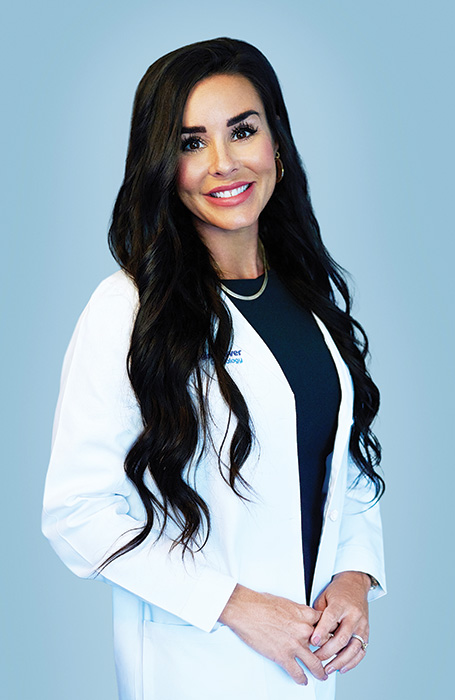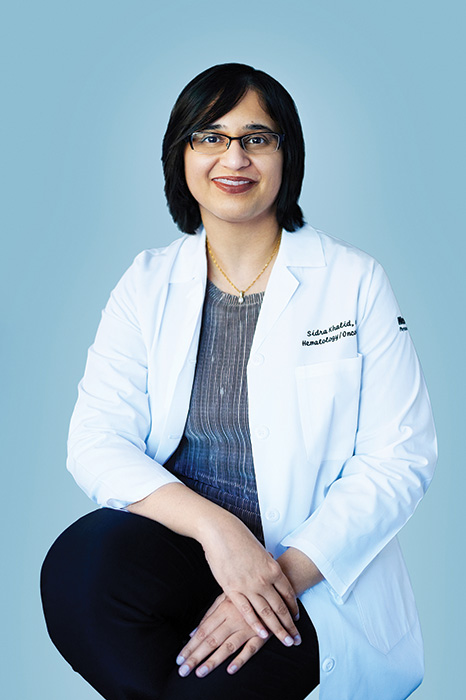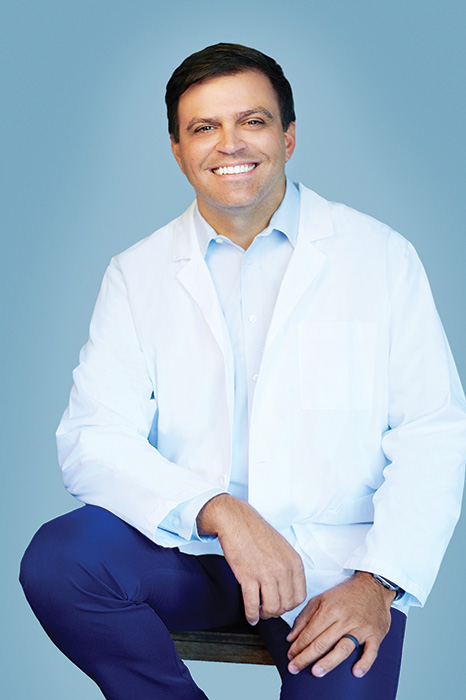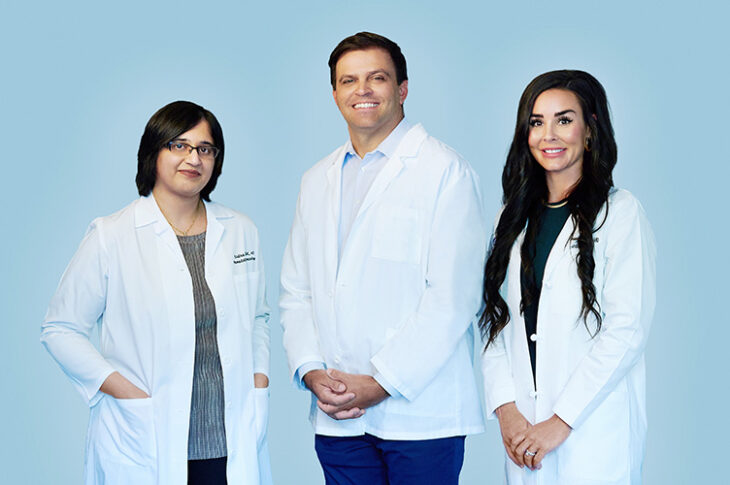Photography by Brandi Stage Portraiture
They practice dentistry, oncology and interventional cardiology respectively, but the doctors featured on our October cover share a passion for medicine, a love for people and optimism about the future of their fields. Meet Dr. Clifford J. Cook, Dr. Sidra Khalid and Dr. Cherie Champagne — three physicians who personify compassionate care.
Healing by heart
Dr. Cherie Champagne finds purpose, fulfillment as interventional cardiologist

Saving lives is all in a day’s work for Dr. Cherie Champagne.
As an interventional cardiologist with Singing River Health System, she’s seen many dire cases have happy endings. When patients have come crashing into the cath lab after a cardiac emergency, she’s never forgotten that the person she’s racing to help is someone’s loved one.
“They matter, and to see them on the other side of what seemed futile is so incredibly rewarding,” Champagne says. “I always express to the patients that they clearly have a reason to live and that they are a miracle.
“I have been able to do this two times in the past week. It’s the best feeling there is.”
‘THE PATH THAT WAS MEANT FOR ME’
Although the Ocean Springs native had wanted to be a doctor most of her life, she opted to study nursing initially, receiving her degree from the University of South Alabama. Shortly after starting her nursing career, she knew she needed to go to medical school to truly fulfill her passion.
“I loved being a nurse and wouldn’t trade the path that I took for the perspective that it has given me in my career — not only with my patients, but with the staff,” Champagne says. “I feel like this is the path that was meant for me.”
From her work in the cardiac stepdown unit and the cath lab, she knew when she started medical school that she wanted to be an interventional cardiologist. After earning her doctorate at the University of Mississippi Medical Center and spending seven years at Vanderbilt University Medical Center, Champagne joined the Singing River team in July.
“I knew this was always what I was meant to do, but in the process of choosing a practice to join and actually starting my career, it has only been further enforced that this is the perfect fit for me,” she says. “I have felt such a warm welcome from my new work family. I feel like I am exactly where I am supposed to be at this point in my life.”
THE GIFT OF THE JOB
While there’s no such thing as a typical day for Champagne, her routine includes making rounds to check on patients who have been admitted, meeting new consults and doing procedures in the cath lab. Throughout the day, she often reviews cardiac studies such as echocardiograms, EKGs and stress tests. On some nights and weekends, she covers emergency cases like heart attacks that may require emergent, life-saving procedures.
“I love the procedures and taking care of very sick patients, but the best part of the job is when these patients come back to
clinic to see you when they are well again,” Champagne says. “It is the relationships with the patients and their families that is the gift of the job.”
Her most memorable cases are those where against all odds, the patient not only survives, but thrives. Given how quickly her specialty is changing, Champagne expects even more success stories in the future.
“I imagine that in five to 10 years, there will be ever-evolving medical management and interventional treatment options available to provide care to patients who were previously told, ‘There is nothing left to do,’” she says. “The evolution of the field is continually opening up previously closed doors to patients to allow for a better quality and increased quantity of life.”
THE CAREER SHE ALWAYS DREAMED ABOUT
As much as she’s grown professionally of late, Champagne also has undergone significant personal changes. She wed her husband, Corey Champagne, last November, and they have settled into married life in Ocean Springs with their two pups, goldendoodle Piper and lab mix Spud.
The couple has faced several challenges in a relatively short time, including the loss of Champagne’s grandmothers and her mom within the course of a year. But the devoted doctor finds solace in her husband’s constant support and in her work — which she prays will always do her mom proud.
“She was my biggest cheerleader and supporter,” Champagne says. “I know she is watching, but I wish she were here to see this long journey lead to the career I always dreamed about.”
A beacon of hope for Coast cancer patients
Dr. Sidra Khalid’s dedication, compassion shine in fight against deadly disease

Every cancer patient wages a unique battle, and Dr. Sidra Khalid recognizes that each one needs and deserves specialized care.
A medical oncologist with Memorial’s Medical Oncology Group, Khalid grew up in Canada but has earned many fans during her three years on the Coast.
“She cares; she is honest. And thankfully, she has a very witty sense of humor that I adore,” Tamara Cargo raved in an online review. “I would not want anyone else by my side.”
“Wonderful doctor!” exclaimed another reviewer, Rod Stieffel. “Very caring, understanding, attentive and always has a smile.”
Khalid was drawn to oncology because it is rapidly evolving, which gives patients ever-improving treatment options. Being a voice of hope, and affecting others’ lives so positively every day, are major perks of the job.
“Another main reason for choosing medical oncology as a specialty is that it allows me to develop physician-patient relationships,” she says. “There is a continuity of care, and trust develops over time.”
AN INTERESTING TIME TO PRACTICE
Recent events, including the COVID-19 pandemic, have reinforced why Khalid wanted to become a doctor — an aspiration she’d held since childhood. She studied medicine at Rawalpindi Medical College in Pakistan, then completed her internal medicine residency training at Fairview Hospital – Cleveland Clinic and her subspecialty training in medical oncology at Queen’s University in Kingston, Canada.
She began practicing on the Coast in mid-2020 at the height of the pandemic, which added another layer of challenge to an already complex field.
“Telehealth was available, but it was difficult to fully assess patients and make treatment decisions,” Khalid says. “Treatments were delayed due to COVID-19 infections. Cancer patients, especially on active treatment, were immunocompromised and at high risk from COVID-19 complications.”
Problem-solving is part of any doctor’s job description, and Khalid and her fellow oncologists worked with the infectious disease team to adjust and adapt, employing vaccines, monoclonal antibodies, the oral antiviral pill Paxlovid and other tools at their disposal.
Similarly, Khalid is encouraged to see more weapons entering the fight against cancer.
“It is a very interesting time to practice, as many newer agents are being developed, tested in clinical trials and being FDA approved for patients,” she says.
Using next-generation sequence testing of tumor tissue or liquid biopsies, Khalid says doctors and researchers can identify and take aim at certain mutations with targeted treatments. Doctors also have seen success with immunotherapy, which uses substances made by the body or in a lab to boost the immune system and help the body find and destroy cancer cells.
“In some cases, patients can obtain a complete response or stable disease even for a stage-four cancer; when that happens, it is remarkable,” Khalid says. “In a few of my patients, the metastatic lesions were in unusual sites such as the eye or heart, and with immunotherapy, they had a great response.”
TEACHING, LEARNING, COLLABORATING
Aside from helping patients directly, Khalid also teaches residents about oncology in the outpatient clinic and in the hospital setting.
“It is imperative that residents learn that oncology patients do well if they are diagnosed early,” she says. “Also, patients in the later stages of cancer are doing well with newer treatment options.”
Given the trajectory of her field, the doctor expects to see even better treatments, as well as more collaboration to provide better care to rural communities, in the future. Today, clinical research is usually part of an oncologist’s profession, she adds, and The Medical Oncology Group at Memorial is affiliated with LSU Health – New Orleans for that purpose.
“We have a virtual nurse program with LSU, through which we are trying to enroll patients into clinical trials,” Khalid says. “The goal is to provide clinical trials closer to patients’ homes.”
COMMUNICATION IS KEY
Any cancer diagnosis changes lives, and Khalid urges patients to meet with an oncologist who specializes in cancer care to learn about the disease and devise a plan. Treatment varies depending on the stage, she adds, and the earlier the disease is caught and treated, the better the chances of survival.
“There is a lot of information online,” Khalid says, “and you can discuss that with an oncologist as well.”
Voicing emotions is important, too, and Khalid notes that many resources are available to help patients and their families manage cancer’s emotional toll — for instance, Memorial’s cancer team.
“Open communication is key in order to optimize your chances of having a good treatment experience,” she says. “Don’t be afraid to ask questions.”
Shaping smiles and changing lives
Dr. Clifford J. Cook puts compassion, technology at heart of his dentistry practice

Like many younger siblings, Dr. Clifford J. Cook admired his older brother — so much so that he entered the same profession.
“My brother was 14 years older than I, and he decided to go into pediatric dentistry; I had the fortune of being able to watch him succeed,” Cook recalls. “I even got to live and work with him after I graduated from college. His wisdom and direction really shaped me into what I wanted to be and who I am today.”
Now a husband, father of three daughters and a respected dentist in his own right, Cook has practiced for 15 years and heads Broadwater Dental in D’Iberville. Beyond his brother’s influence, he says he picked his specialty because he knew he could be good at it and make a difference in people’s lives.
“Being a business owner and solo doctor really sets dentistry apart,” Cook adds. “We are able to function autonomously, and that gives us a lot of freedom to treat our patients’ needs and take an active role in their oral health.
‘I LOVE TO CREATE THINGS’
Cook’s educational foundation includes a degree in biomedical sciences from the University of South Alabama and a master’s degree from Mississippi College. He went on to graduate from the University of Mississippi’s Medical Center in 2009, where he served as president of his class and received awards for leadership and outstanding achievement in clinical dentistry.
As a self-described “artistic person,” Cook finds that his field provides plenty of inspiration and room for imagination.
“I love to create things, and dentistry has allowed me to do this in so many ways,” he says. “With the introduction of technology into our profession, we are able to do things we never thought possible.”
Broadwater Dental has benefited from Cook’s wealth of experience, which includes working under other reputable doctors and using some of dentistry’s most advanced technologies. He also has passed on his knowledge to future generations as a clinical instructor for the University of Mississippi School of Dentistry.
NO NEED FOR FEAR
While many patients still see dentists as “scary” and associate their offices with pain, Cook always tells his patients he is here to help them in a calm, understanding way.
“My first practice purchase was a sedation practice; this means many patients were so scared they had to be sedated to have work completed,” he says. “We were able to retain over 85 percent of these patients without sedating anyone.”
When choosing any healthcare provider, Cook suggests searching for someone who will listen and understand your needs, help you make a plan, break that plan down and work with you step by step to achieve it.
“No matter what branch of medicine, find someone you trust and commit yourself to a better you,” he says. “There is no better way to achieve your goals than to get started with someone you trust.”
AT THE FOREFRONT OF A REVOLUTION
In addition to his admirable bedside manor, Cook says his profession has progressed so much over the past 30 years that dental visits are more comfortable than ever for patients.
“Lasers take the place of drills. Scanners take the place of nasty impression materials. 3D imaging is making surgery an absolute perfection,” he says. “Technology is the center of our revolution.”
Within five years, Cook thinks that technology will make dentists even better at detecting and preventing oral disease. In In a decade, he believes that perfection in restorative dentistry will be more achievable than ever, and in 20 years, he predicts that the ability to grow new teeth in vivo will replace the need for artificial tooth replacement.
“As long as we maintain our ethics, we will be able to accomplish more than ever,” he says, “and I am excited to be a part of a profession that can be a big part of this.”



